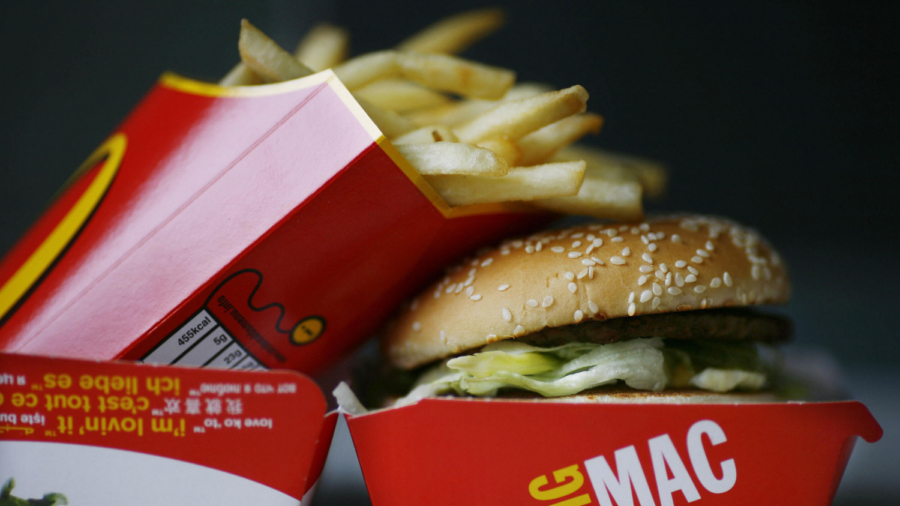Beware of fast food self-service touchscreens, a report has warned after fecal matter was found on every McDonald’s touchscreen kiosk tested during an investigation in the United Kingdom.
The tests were conducted at six McDonald’s locations in London and two in Birmingham, where screens were swabbed for lab testing. All eight samples were contaminated with coliforms, a type of bacteria found in human fecal matter. The report labeled the results as being potentially “enough to put people in the hospital.”
Study finds enough fecal matter on McDonald’s touchscreens to put people in the hospital.https://t.co/ecT8VrxmTh
— FOX26 News (@KMPHFOX26) March 27, 2019
The touchscreens help to simplify the ordering process for customers, who select their meals onscreen before heading to the counters to pay and pick up their food. But all too often, those in contact with the kiosks fail to wash their hands or use hand sanitizer, the report suggested.
In contrast to the report’s suggested findings, a McDonald’s spokesperson said, “Our self-order screens are cleaned frequently throughout the day. All of our restaurants also provide facilities for customers to wash their hands before eating,” according to MarketWatch.
Dr. Paul Matawele, of London Metropolitan University, was surprised by the report.
“We were all surprised how much gut and fecal bacteria there was on the touchscreen machines. These cause the kind of infections that people pick up in hospitals,” he said, in an interview with The Metro.
“For instance Enterococcus faecalis is part of the flora of gastrointestinal tracts of healthy humans and other mammals. It is notorious in hospitals for causing hospital-acquired infections,” he added.

One touchscreen tested positive for Staphylococcus. Commonly known as staph, it is type of bacteria found on the skin or in the nose. Most of the time, these germs are harmless but can turn deadly if they enter the bloodstream or the body’s interior.
Some strains of the bacteria can “cause food poisoning when a food handler contaminates food and the food not properly refrigerated. Other sources of food contamination include the equipment and surfaces on which food is prepared,” reported to the U.S. Food Safety website.
Matawele continued to say, “Seeing Staphylococcus on these machines is worrying because it is so contagious. It starts around people’s noses, if they touch their nose with their fingers and then transfer it to the touchscreen, someone else will get it, and if they have an open cut which it gets into, then it can be dangerous.”
He noted a major fear was that Staphylococcus is becoming resistant to the antibiotics used to treat it.
“However, it is still really dangerous in places like Africa where it can cause toxic shock,” he said.
An investigation by @MetroUK took swabs from self-service machines across the UK, every single on coliforms – a bacteria found in poo ???? pic.twitter.com/l70FaIcuY4
— Metro (@MetroUK) November 28, 2018
Inside a London McDonald’s branch, traces of Listeria bacteria were present. Listeria causes listeriosis, which mainly affects children, pregnant women, and older adults, according to health officials. “Listeria is another rare bacterium we were shocked to find on touchscreen machines as again this can be very contagious and a problem for those with a weak immune system,” Matawele said.
In every McDonald’s location tested, about 75 percent of touchscreen kiosks were found to have the Proteus bacteria.
“Proteus can be found in human and animal feces. It is also widely distributed in soil. It can cause urinary tract infections and is also one of the hospital-acquired infections where it may responsible for septicaemia,” he stated. “Klebsiella is also from the gut and mouth. They are associated with urinary tract infections, septicemia, and diarrhea. Some species can infect the respiratory tract, resulting in pneumonia.”
Some say the results of the investigation do not come as a surprise.
Dr. Philip Tierno, a clinical professor of Microbiology and Pathology at NYU School of Medicine, painted a grim picture of the level of hygiene in public spaces.
“We are bathed, as a society, in human feces,” he told MarketWatch. “Wherever numerous people touch the same surface over time, they deposit their germ passport, which can include bacteria from three body places—respiratory, skin, and fecal sources.”
“This (Metro) report shows that people do not properly pay attention to hand hygiene—especially hand washing,” he explained. “Eighty percent of all infectious diseases are transmitted by direct and indirect contact.
“Direct like coughing, sneezing, talking, kissing someone; and indirect like touching a dirty fomite (doorknob, phone, computer, elevator button, touchscreen, etc.) and then touching your eyes, nose, or mouth or a break in the skin.”

